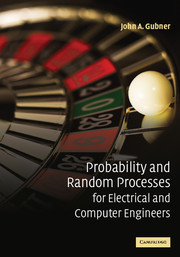
-
Select format
-
- Publisher:
- Cambridge University Press
- Publication date:
- 05 June 2012
- 01 June 2006
- ISBN:
- 9780511813610
- 9780521864701
- Dimensions:
- (247 x 174 mm)
- Weight & Pages:
- 1.38kg, 646 Pages
- Dimensions:
- Weight & Pages:
You may already have access via personal or institutional login
Book description
The theory of probability is a powerful tool that helps electrical and computer engineers to explain, model, analyze, and design the technology they develop. The text begins at the advanced undergraduate level, assuming only a modest knowledge of probability, and progresses through more complex topics mastered at graduate level. The first five chapters cover the basics of probability and both discrete and continuous random variables. The later chapters have a more specialized coverage, including random vectors, Gaussian random vectors, random processes, Markov Chains, and convergence. Describing tools and results that are used extensively in the field, this is more than a textbook; it is also a reference for researchers working in communications, signal processing, and computer network traffic analysis. With over 300 worked examples, some 800 homework problems, and sections for exam preparation, this is an essential companion for advanced undergraduate and graduate students. Further resources for this title, including solutions (for Instructors only), are available online at www.cambridge.org/9780521864701.
Reviews
'… stands alone as a textbook that encourages readers to work through and obtain working knowledge of probability and random processes.'
Source: IEEE Software
Contents
Metrics
Altmetric attention score
Full text views
Full text views help Loading metrics...
Loading metrics...
* Views captured on Cambridge Core between #date#. This data will be updated every 24 hours.
Usage data cannot currently be displayed.
Accessibility standard: Unknown
Why this information is here
This section outlines the accessibility features of this content - including support for screen readers, full keyboard navigation and high-contrast display options. This may not be relevant for you.
Accessibility Information
Accessibility compliance for the PDF of this book is currently unknown and may be updated in the future.


